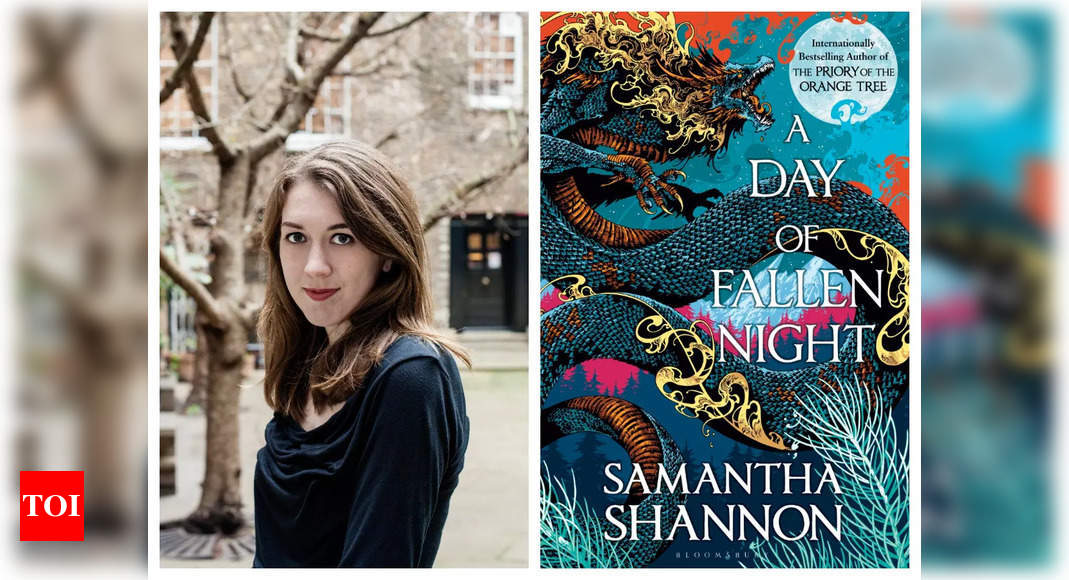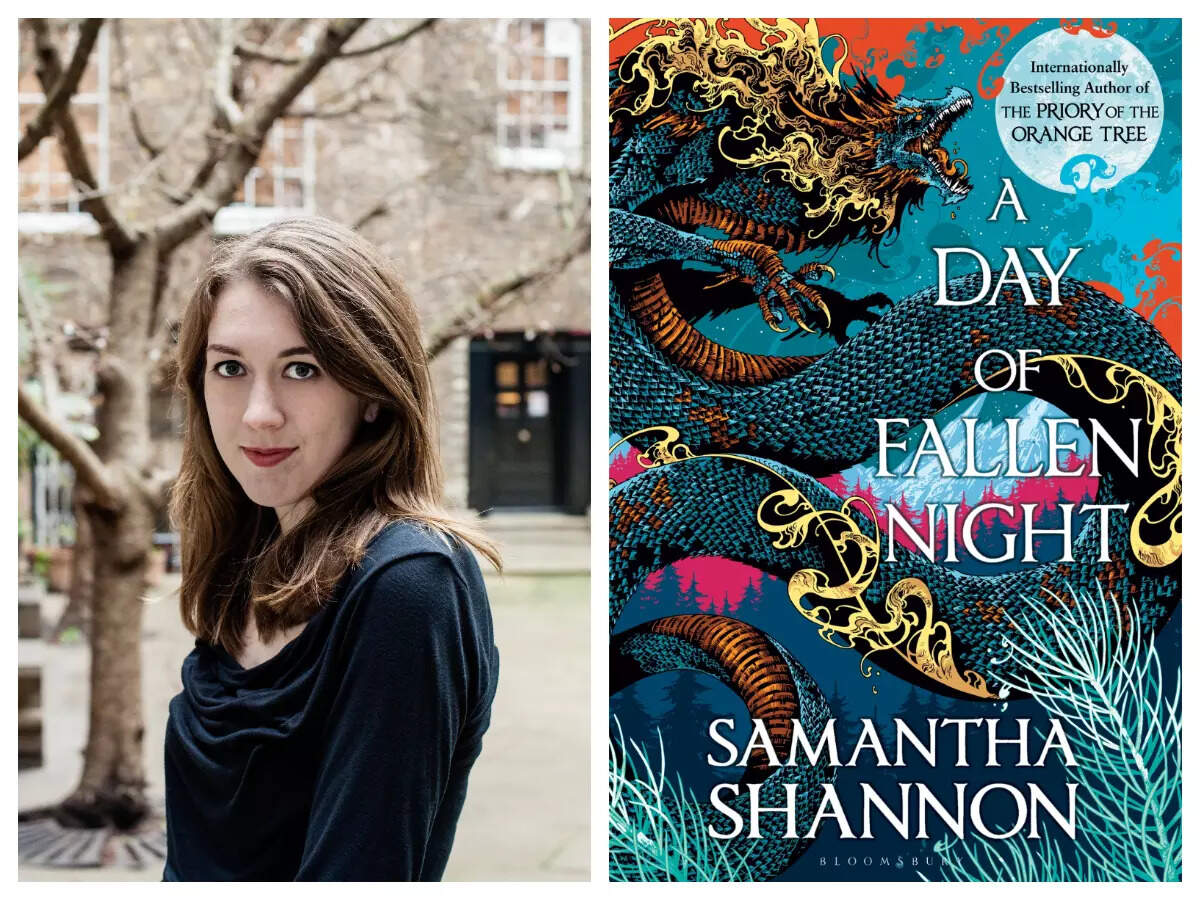There was no revolt, only whispers and fear: Excerpt from ‘A Day of Fallen Night’ by Samantha Shanon – Times of India
She was named Glorian to strengthen her dynasty, in Ascalun, Crown of the West. That had once been the eke name of the city – until the Century of Discontent, when Inys suffered three weak queens. First came Sabran the Fifth. Queen since the day she was cut from her mother, she loved that her existence kept the Nameless One from rising. In her eyes, it was only fair that she spent her life rewarding herself for that service.
The Virtues of Knighthood had no hold on Sabran. There was no temperance in her greed, no generosity in her hoarding, no justice in her want of mercy. She doubled taxes, her treasury bled, and within a decade, her queendom was a shadow of itself. Those who dared question her were pulled apart by horses, their heads set on the castle gates. Her subjects called her the Malkin Queen, for she was to her enemies as the grimalkin to the mouse.
There was no revolt. Only whispers and fear. After all, the Inysh knew her bloodline was the great chain on the Nameless One. Only the Berethnets kept the wyrm at bay. Still, with only foulness to inspire them, the people lost all pride in their capital. Hounds and rats and swine ran wild. Filth choked and slowed the river, so the people renamed it the Lumber.
In her fortieth year, the queen remembered to fulfil her duty to the realm. She wed a noble of Yscalin, whose heart gave out not long after the ceremony. Her councillors prayed she might die in childbed, but she strode triumphant from the birthing chamber, a plump baby girl Sabran squalling in her wake – a new link in the chain, binding the beast for the next generation. The queen made a sport of mocking the child, seeing in her daughter a feeble imitation of herself, and Jillian, in turn, grew hard and bitter, and then cruel. Whatever her mother gave, she returned, and the two pecked at each other like a pair of crows. Sabran married her to a drunken fool, and soon Jillian had a girl of her own.Marian was a fragile soul, afraid to raise her voice above a whisper. Her relatives ignored her, and she thanked the Saint for it. She lived quietly, and wed quietly, and quietly got with child. Into this decaying house, a third princess was born.
Sabran was her name, to please the tyrant. No sound escaped her, but a crease rumpled her tiny brow, and her bottom lip poked out. ‘Saint, poor lamb,’ the midwife said. ‘How stern she looks.’ Marian was too weary to care. Not long after the birth, the Malkin Queen deigned to visit, shadowed by the crown princess. Marian shrank away from them both. ‘Named after me, is she?’ The white-haired queen laughed at her. ‘How you flatter me, little mouse. But let us see if your bantling amounts to more than you, before we draw comparisons.’ Not for the first time in her life, Marian Berethnet wished the earth would crack open and swallow her.
****
Like every other woman of her house, Lady Sabran grew to be tall and striking. It was a well-known fact that each Berethnet queen gave birth to one girl, who came to look just like her. Always the same black hair. Always the same eyes, green as southern apples. Always the same pale skin and red lips. Before old age changed them, it could often be hard to tell them apart. But the younger Sabran did not have her mother’s fear, her grandmother’s spite, or the tyrant’s cruelty. She carried herself with purpose and dignity, never rising to a taunt. She kept her own company as much as she could, and the company of her ladies, who she trusted above anyone. Her tutors educated her in the history of Virtudom, and when she excelled in those lessons, they taught her to paint and sing and dance. They did this in secret, for the queen hated to see other Berethnets happy – and to see them learn to rule.
For ten years, the entire court watched the youngest of the four. Her ladies were the first to hope that she might be their saviour. They saw the line that never left its seat between her brows. They walked with her to the castle gates, where she took stock of the rotten heads, her jaw clenched in disgust. They were there when the Malkin Queen tried to break her, the day she first woke to blood on her sheets.‘I was told you are ready to make a green-eyed bairn of your own,’ the old queen said. ‘Fear not, child … I shall not let your beauty wither on the vine.’ Her face was like the skin on milk, powder sunk into its creases. ‘Do you dream of being queen, my lamb?’ Lady Sabran stood at the heart of the throne room, in sight of two hundred courtiers. ‘I dare not, Your Grace,’ she said, her voice quiet yet clear. ‘After all, I could only be queen if you were no longer on the throne. Or, Saint forbid . .. if you were dead.’
The court rippled.
It was treason to imagine the death of the sovereign, let alone speak of it. The queen knew this. She also knew she could not kill her granddaughter, for it would mean the end of the bloodline and her power. Before she could reply, the child left, followed by her ladies.By that time, the Malkin Queen had held the throne for over a century. For too long, no one had been able to imagine a world free of her, but from that day on, hope was reborn. From that day on, the servants referred to Lady Sabran – always in whispers – as the Little Queen. The tyrant died, aged one hundred and six, in her bed of finest Ersyri silk, Lasian gold on every finger. Jillian the Third was next to sit the marble throne, but few rejoiced in earnest. They knew Jillian would take all that her mother had denied her.
Not a year after her coronation, a man slipped into the hall where Queen Jillian was dining. The late queen had ordered him tortured to madness. He stabbed her daughter in the heart, thinking she was his tormentor. She was laid beside the tyrant in the Sanctuary of Queens.Marian the Third wore the crown as if it were a poisonous snake. She refused to see petitioners who sought help from their sovereign. She feared even her councillors. Sabran pressed her mother to demonstrate more strength, but Marian was too afraid of Inys to control it. Not for the first time, there were rumblings – not just of discontent, but rebellion.
Blood averted blood, for war awoke in Hróth.
For all the latest lifestyle News Click Here


